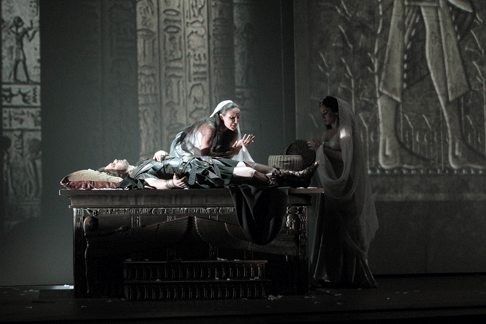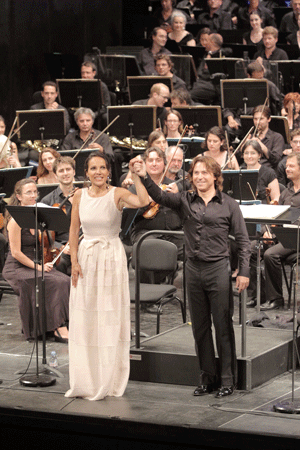(And, yes, Roberto Alagna as Enée [Aeneas]).
French grand opera adores the mezzo-soprano voice, among its greatest roles are legendary personages who expound human warmth and honest sensuality. Just now there were three of these unique creatures in Marseille — Cléopâtre, Cassandre and Didon — all in the person of French mezzo-soprano Béatrice Uria-Monzon (born of a Spanish father).
Mme. Uria-Monzon was the Carmen ne plus ultra on major stages twenty years ago. Her roles are now mature women of courage and resolve (like Tosca too, Mme. Uria-Monzon’s current rôle fétiche). At fifty years of age now Mme. Uria-Monzon reads as a beautiful woman in her vocal prime. Her sound is big and secure, beautiful and elegant, uniformly produced throughout the mezzo register. Her expressive subtleties, her musicianship are created by rhythm and volume gradation more so than by variation of color.
Not that Massenet’s Cléopâtre is among French grand opera’s greatest works. Having long since given the world his masterpieces Massenet kept turning out operas, the last opera, Cléopâtre, premiered posthumously in Monte Carlo (1914). It is almost the same story as Dido (beautiful woman entraps vulnerable man who abandons her). By 1912, the year of his death, Massenet knew how to write an opera, the final count was forty.
Cléopâtre takes place in a warring world (lots of fanfare) engendering wrenching farewells not to mention betrayals (lots of singing). It was therefore a very pleasurable afternoon if you like fanfares and arias (well, we all do) and you do not look to closely or expect too much. Marseille’s venerable metteur en scéne Charles Roubaud endowed this slight work with a perfect staging that would have pleased the monegasques (those who reside in Monaco) in the heady days just before the first world war.
Its hero, Marc Antoine was impersonated by handsome Canadian (Quebec) baritone Jean François Lapointe who sings well and seems most at home in giddy moments. His rival for Cleopatra’s attention, Spakos was keenly portrayed by Marseille born tenor Luca Lombardo, and Mark Anthony’s faithful and forgiving wife Octavie was beautifully sung by Canadian (Quebec) soprano Kimy McLaren. Conductor Lawrence Foster realized the maximum possible from Massenet’s score.
As Carthage’s Dido in Berlioz’ Les Troyens mezzo soprano Béatrice Uria-Monzon towered in stature far above Egypt’s flighty Cleopatra. Berlioz’ endows his tragic queen with sublime music. The Berlioz muse is iconoclastic, quite personal, even naive allowing this heroine an emotional simplicity and honesty that explodes first in delicate sexuality and finally in rage at Aeneas. Mme. Uria-Monzon as Troy’s Cassandra on the other hand needed to threaten the Trojans with her prophecies. These menaces lie in an emotional range less present in Mme. Uria-Monzon’s persona, though such violent utterances did find resonance within her voice.

It was a concert version of Les Troyens in Marseille, within this format Mme. Uria-Monzon shined, creating first Cassandra and then Dido in her voice then adding minimal physical movement in gesture and expression that carefully etched and held character even in concert format. Overt physical action was however implicit in the Berlioz orchestra, the five trumpets and four trombones detailing its bellicose happenings (the finale of the Trojan War, the proto-Hannibal invasion of Carthage and, not least, the founding of Rome).
Seventy-two year old American conductor Lawrence Foster, the lone linguistically foreign presence (well, save a tenor from Texas), drew an always driving, rhythmically square, colorfully detailed performance from the Marseille Orchestra who skillfully created non-stop thunder, be it military description or deeply personal emotional statement. Mo. Foster is the new music director of the Marseille orchestra, its first in many years. He has the task of honing it into an ensemble of true stature. Much progress has already occurred, there is the assumption that obvious deficiencies will soon disappear as well.
The violins are solid (twelve firsts and twelve seconds), the cellos and violas sang quite beautifully. Berlioz makes much use of a wind quartet (flute, oboe, clarinet and bassoon) in various combination to color his story, and these players proved fully capable of providing this big time maestro and Berlioz what they demanded. The French horn duet was intoned and echoed in appropriately sweet and supple tones, a very visible and very appreciated orchestral high point of the evening.
Among the high points of the five hour evening was the fourth act Anna (Dido’s sister) and Narbal (a government minister) duet discussing, no surprise, duty versus love. In this concert performance several roles were double cast, not just the tour de force of Cassandra/Dido. Bass Nicolas Courjal sang Narbal, Priam and the ghost of Hector. He is a beautifully voiced young singer who early in the evening had made Priam’s description of the sack of Troy especially moving.

Texas tenor Gregory Warren as Iopas softly sang the Ode to Cérès as well as the Song of Hylas in sweetly beautiful tones (he also urgently delivered a few messenger one-liners). In a staged performance both of these stand alone songs assume greater relief than in a concert performance. Here they were the only episodes where scenic atmospheres were sorely missing.
The field of mezzo-sopranos (not a soprano in sight) was completed by Clémentine Margaine as Dido’s sister Anna and Marie Kalinine as Aeneas’ son Ascanio. Mlle. Margaine is obviously a Carmen of stature whose bolder presentation served to underline the subtlety and delicacy of Béatrice Uria-Monzon’s Dido.
Not to forget the Trojans and the Carthaginians, the eighty or so voices of the Opéra de Marseille chorus who suffered and raged with Berlioz’ inimitable gusto and proved themselves an ensemble of true operatic stature. The tenors made an exceptionally beautiful sound.
That leaves Aeneas, Roberto Alagna. Sad to say this famous tenor was a black hole in an otherwise superb evening. He was obviously unprepared, losing his way in his big moment in the fifth act; unsure of himself he resorted to inappropriate tenorial vocal mannerisms (heaving the voice, exaggerated scooping); unable to trust his musicianship he compensated with non-stop gesturing; apparently unable to deliver the nuit d’ivresse et d’extase infinie he availed himself of sotto voce, vocal trickery that simply caricatured a lover. Most disappointing were the antics he affected as he was being booed.
Michael Milenski
For an appreciation of the Opéra de Marseille please see Marseille, Capital of European Culture
Cléopâtre: Cast and Production
Cléopâtre: Béatrice Uria-Monzon; Octavie: Kimy McLaren; Charmion: Antoinette Dennefeld; Marc Antoine: Jean-François Lapointe; Spakos: Luca Lombardo; Ennius: Philippe Ermelier; Amnhès: Bernard Imbert; Sévérus: Jean-Marie Delpas. Chorus and Orchestra of the Opéra de Marseille conducted by Lawrence Foster. Mise en scéne: Charles Roubaud; Décors: Emmanuelle Favre; Vidéos: Marie-Jeanne Gauthé; Costumes: Katia Duflot; Lumières: Marc Delamézière. Opéra de Marseille, June 23, 2013.
Les Troyens: Cast and Production
Didon / Cassandre: Béatrice Uria-Monzon; Ascagne: Marie Kalinne; Anna: Clémentine Margaine; Hécube / Polyxène: Anne-Marguerite Werster; Enée: Roberto Alagna; Chorèbe: Marc Berrard; Panthée / Mercure: Alexandre Duhamel; Narbal / Priam / Ombre d’Hector: Nicolas Courjal; Iopas / Hylas: Gregory Warren; Un Chef grec / 1ère sentinelle: Bernard Imbert; Prêtre de Pluton / 2ème sentinelle: Antoine Garcin; Helenus: Wilfried Tissot. Chorus and Orchestra of the Opéra de Marseille conducted by Lawrence Foster. Opéra de Marseille, July 15, 2013.
Photos: copyright Christian Dresse, courtesy of Opéra de Marseille


